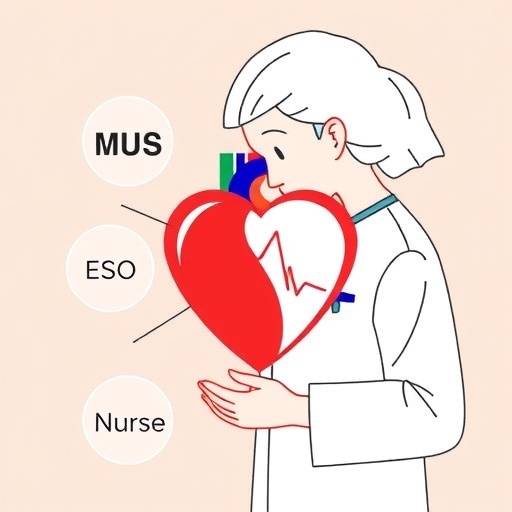Nursing interventions are of paramount importance in the continuous battle against cardiovascular disease (CVD), a leading cause of mortality globally. The recent narrative review conducted by Garea and Díaz sheds light on evidence-based strategies that nurses can implement to mitigate the risk of cardiovascular complications. This comprehensive exploration into nursing interventions is more than just a collection of strategies; it aims to integrate the principles of preventive healthcare into daily nursing practice.
Cardiovascular disease encompasses a range of disorders affecting the heart and blood vessels, which can lead to severe complications, including heart attacks and strokes. Nurses are uniquely positioned to play an essential role in educating patients about their health, identifying risk factors, and ensuring compliance with treatment protocols. The review highlights that, with the increasing prevalence of CVD, healthcare professionals must prioritize prevention strategies within their patient care routines.
One of the most effective nursing interventions identified in the study involves comprehensive patient education. Empowering patients with knowledge about cardiovascular health can significantly affect their lifestyle choices. Nurses can teach patients about the importance of maintaining healthy dietary habits, engaging in regular physical activity, and managing stress effectively. These elements are crucial components in reducing the risk factors associated with CVD, emphasizing the need for a collaborative approach between patients and healthcare providers.
Furthermore, Garea and Díaz emphasize the significance of monitoring vital signs and cardiovascular metrics as part of routine nursing practice. The early detection of hypertension, elevated cholesterol levels, and abnormal blood sugar levels can lead to timely interventions that can alter the disease’s trajectory. Nurses must be diligent in conducting assessments and utilizing patient data to foresee potential complications and initiate preventative measures.
In addition to direct patient education and monitoring, the role of community outreach programs is discussed in the review. By engaging communities in awareness campaigns about cardiovascular health, nurses can extend their impact beyond individual patients. Programs that promote heart-healthy lifestyle changes within communities can result in a collective reduction in cardiovascular disease incidence. Such initiatives can create a supportive environment that fosters healthier choices and brings awareness to the significance of heart health.
Moreover, the study highlights the importance of tailored interventions that consider each patient’s unique lifestyle, background, and existing health conditions. A one-size-fits-all approach is inadequate when it comes to health promotion and disease prevention. For instance, interventions should be culturally sensitive and adaptable to meet diverse needs. Nurses are encouraged to incorporate individual assessments into their care plans, ensuring that strategies resonate with their patients’ real-life situations.
The review also points out mental health’s crucial link to cardiovascular health. Stress management techniques, mindfulness practices, and providing emotional support are essential facets of nursing interventions that cannot be overlooked. By addressing mental health issues, nurses can help patients cope better with stress, which is a significant risk factor for heart disease. Educating patients about the mind-body connection and advocating for mental wellness can lead to improved overall health outcomes.
Another compelling aspect of nursing interventions involves encouraging regular follow-up appointments. Continuity of care is vital for patients on medication for cardiovascular issues. Nurses play a pivotal role in ensuring that patients adhere to their treatment regimens, understand their medications, and grasp the importance of regular check-ups. By facilitating ongoing communication, nurses can help avoid adverse outcomes related to non-compliance and missed appointments.
Preventive strategies are also significantly influenced by the evolving landscape of technology in healthcare. The review touches upon the utilization of telehealth services, wearable devices, and mobile health applications that can assist patients in managing their cardiovascular risk. Nurses can leverage these technologies to enhance patient engagement, track health metrics, and provide remote support. This tech-driven approach can make health management more accessible and appealing to younger populations.
Additionally, the interplay between nutrition and cardiovascular health cannot be overstated. The review underscores the necessity for nurses to advocate for nutrition education and the inclusion of registered dietitians in care teams. Understanding dietary factors that influence heart health can empower patients to make informed choices. Nurses should encourage diets low in saturated fats, trans fats, cholesterol, and sodium while promoting the intake of fruits, vegetables, whole grains, and healthy fats.
Furthermore, the importance of physical activity is profoundly interconnected with cardiovascular health. The narrative review supports the notion that regular exercise has remarkable benefits, reducing the risk of developing heart disease. Nurses should encourage patients to integrate physical activity into their daily routines creatively. Whether through structured exercise programs or encouraging active lifestyles, nurses can help patients overcome barriers to staying active.
Lastly, the study identifies a need for ongoing research to continually refine and validate prevention strategies. As the science of cardiovascular health evolves, so too must the nursing interventions employed by healthcare professionals. Continuous professional development and education are necessary for nurses to stay informed about the latest research and best practices in CVD prevention.
Overall, Garea and Díaz’s narrative review underscores the multifaceted role of nursing in cardiovascular disease prevention. Through patient education, community outreach, tailored interventions, and new technologies, nurses can significantly reduce the burden of heart disease. This review not only highlights current practices but also serves as a call to action for nurses to embrace their vital role in promoting cardiovascular health.
Subject of Research: Nursing interventions for cardiovascular disease prevention.
Article Title: Nursing interventions for cardiovascular disease prevention: a narrative review of evidence-based strategies.
Article References:
Garea, S.C., Díaz, M.J.F. Nursing interventions for cardiovascular disease prevention: a narrative review of evidence-based strategies.
BMC Nurs 24, 1269 (2025). https://doi.org/10.1186/s12912-025-03885-1
Image Credits: AI Generated
DOI: https://doi.org/10.1186/s12912-025-03885-1
Keywords: Nursing, cardiovascular disease, prevention, patient education, community health, mental health, diet, exercise, technology.




